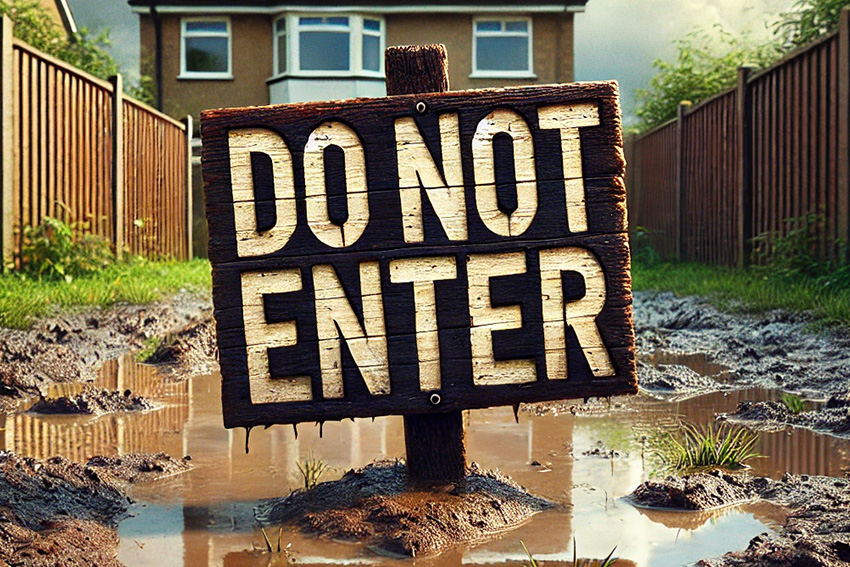Top Winter Health Hazards for Dogs in Portland Yards

Portland winters are known for their rain, cold temperatures, and muddy yards, creating the perfect environment for hidden health hazards to affect your dog. While wintertime brings unique challenges, understanding the risks can help you protect your furry friend and ensure they stay safe and healthy all season long. From bacterial infections to physical dangers, here’s what every dog owner should watch out for during Portland’s winter months.
The Dangers Lurking in Your Yard
Wet, muddy yards can harbor a variety of health risks that are often invisible to the naked eye. Pet waste, stagnant water, and contaminated soil become breeding grounds for bacteria, parasites, and other harmful microorganisms. Combine this with slippery surfaces and freezing temperatures, and you have a recipe for potential hazards.
Bacterial Infections
During winter, wet and muddy conditions increase the chances of bacterial infections in dogs. Pathogens such as E. coli and Salmonella, often found in pet waste, thrive in damp soil and can lead to gastrointestinal distress if ingested. Dogs that lick their paws after walking through contaminated areas are especially vulnerable to these infections.
Parasite Infestations
Parasites like roundworms, hookworms, and Giardia survive longer in Portland’s cold, wet winters. These parasites can be ingested when dogs come into contact with contaminated soil or water. Giardia, in particular, thrives in standing water, making puddles in your yard a significant risk.
Paw and Skin Issues
Mud and wet soil soften paw pads, leaving them more susceptible to cuts, abrasions, and infections. Prolonged exposure to moisture can also lead to skin irritation or fungal infections, especially for breeds with thick coats or folds in their skin.
Hypothermia and Frostbite
While Portland winters are typically mild, extended exposure to cold, wet conditions can lead to hypothermia or frostbite in dogs. Small breeds, senior dogs, and those with short coats are particularly at risk. Frostbite can occur on exposed areas like the ears, paws, and tail, causing pain and potential tissue damage.
Toxic Exposures
Winter brings an increased risk of toxic exposures in your yard. Antifreeze, which has a sweet taste that attracts dogs, can be deadly even in small amounts. Additionally, certain de-icing salts can irritate paws or cause gastrointestinal upset if ingested.
Physical Injuries
Muddy and slippery yards can create physical hazards for dogs. Running or playing in these conditions increases the risk of sprains, strains, or even fractures from slips and falls. Uneven terrain caused by mud puddles or eroded soil can also contribute to injuries.
How to Protect Your Dog This Winter
While winter brings its challenges, proactive steps can help keep your dog safe and healthy:
Maintain a Clean Yard
Regularly clean up pet waste to minimize the spread of bacteria and parasites. Consider hiring a professional pooper scooper service to ensure thorough cleanup, especially during the wet season.
Create a Designated Potty Area
Train your dog to use a specific spot in the yard for bathroom breaks. Use gravel, sand, or artificial turf to reduce mud and contamination.
Keep Paws Clean and Dry
After outdoor play, wash your dog’s paws with warm water to remove mud and contaminants. Dry them thoroughly to prevent moisture-related infections. Applying paw balms can create a protective barrier against irritants.
Provide Protective Gear
Invest in waterproof dog coats and booties to shield your pet from the cold and wet. This is especially important for short-haired breeds or dogs with sensitive paws.
Prevent Access to Toxic Substances
Store antifreeze and other hazardous chemicals out of reach. If using de-icing salts, opt for pet-safe products to avoid irritation or poisoning.
Stay Active Indoors
Rainy winter days can limit outdoor play, so incorporate indoor activities to keep your dog active and mentally stimulated. Puzzle toys, training sessions, and indoor fetch are great options.
Monitor Your Dog’s Behavior
Watch for signs of illness, such as vomiting, diarrhea, lethargy, or limping. Early detection of health issues can prevent more severe complications.
Boost Your Dog’s Immune System
Feed your dog a balanced diet rich in vitamins and minerals. Consider adding omega-3 fatty acids to support skin health during the damp winter months.
When to Call the Vet
If your dog shows any signs of hypothermia (shivering, lethargy, or confusion), frostbite (discolored or swollen skin), or infection (persistent redness, swelling, or discharge), contact your veterinarian immediately. Prompt action can make all the difference in your pet’s recovery.
The Role of Professional Services
Managing winter health hazards can be overwhelming, especially for busy pet owners. Professional pooper scooper services can help maintain a clean yard by not only removing waste but also disinfecting and deodorizing high-traffic areas. This ensures a safer environment for your pet while giving you peace of mind.
Portland’s winter months bring unique challenges, but with the right precautions, you can keep your dog safe, healthy, and happy. By maintaining a clean yard, protecting their paws, and staying vigilant for signs of illness, you can enjoy the season with your furry friend worry-free. Investing in professional services and protective gear can further ensure your dog’s well-being, making winter a time for cozy companionship rather than preventable health risks.

